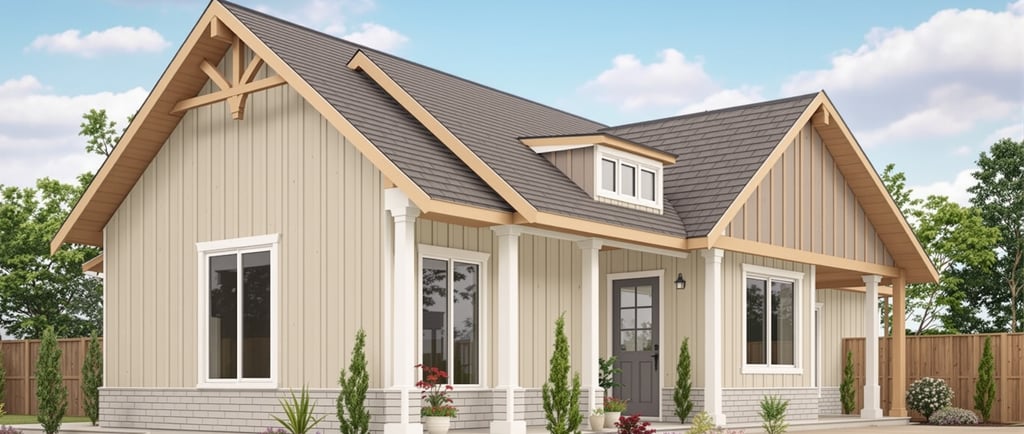Top Questions to Ask Your Prefab Home Builder
11/13/20257 min read


Understanding Prefab Homes
Prefab homes, or prefabricated homes, represent a modern residential solution that is rapidly gaining popularity among prospective homeowners. The term "prefab" encompasses various construction methods that involve assembling parts of a home off-site before transport to the final site. This innovative approach can significantly enhance efficiency, reduce waste, and often lead to lower construction costs compared to traditional building methods.
There are several types of prefab homes, with modular, panelized, and pre-cut homes being the most common. Modular homes are constructed in sections (modules) in a factory setting and then transported to the site for assembly. This method allows for considerable design flexibility and can often accommodate customizations, making them an attractive option for many buyers. Panelized homes, on the other hand, consist of pre-fabricated panels that are assembled on-site. This option tends to expedite the building process but may involve less complexity in design. Lastly, pre-cut homes, which include systems such as kit homes, provide pre-measured and pre-cut pieces delivered to the building site, where they can be constructed by the homeowner or hired labor.
The benefits of choosing a prefab home are noteworthy. One of the primary advantages is the speed of construction; since components are built and assembled in a factory setting, the project can often be completed in a shorter time frame compared to conventional homes. Additionally, a controlled factory environment tends to minimize weather-related delays and can contribute to higher quality control standards. Moreover, many prefab homes are designed with energy efficiency in mind, enabling homeowners to save on utility costs over time. These factors, combined with potential cost savings and design versatility, make prefab homes an increasingly viable option for those looking to build a new home in today's market.
Experience and Reputation
When contemplating the construction of a prefab home, one of the most critical factors to consider is the experience and reputation of your chosen builder. Assessing a builder's background can provide essential insights into their reliability and the quality of work you can expect. Begin by inquiring about the number of years the builder has been in business. A company with a long-standing history in the prefab home industry is often indicative of their expertise and operational stability. This experience can translate into a deeper understanding of construction processes, permitting, and customer service.
Further, it is crucial to scrutinize examples of past projects completed by the builder. Requesting a portfolio or case studies allows you to evaluate their workmanship, design capabilities, and the overall quality of their constructions. A builder with extensive experience should be able to showcase a variety of projects that reflect their versatility and adaptability to different client needs and preferences.
In addition to project examples, customer testimonials serve as a valuable tool for assessing a builder’s reputation. Consider asking for references or seeking out online reviews, which may provide insight into the client experience. Positive reviews often highlight the builder's responsiveness, transparency, and quality of service, while constructive feedback can reveal areas for consideration. Engaging with past clients can offer firsthand accounts of the building process and may highlight any challenges encountered along the way, which can help you gauge potential risks. Overall, taking the time to evaluate a prefab home builder's experience and reputation is a crucial step towards ensuring that your investment leads to a satisfactory outcome.
Customization Options
When considering a prefab home, one of the most critical aspects to explore is the customization options available. Homeowners should not only inquire about the standard designs offered but also about how flexible those designs can be. Customization is vital for homeowners who wish to create a residence that reflects their unique style and requirements. Initiating a discussion about design flexibility is essential; it allows homeowners to understand whether they can adjust floor plans, dimensions, or even the layout of rooms to better suit their preferences and lifestyle.
Moreover, material selections play a significant role in customization. It is important for prospective homeowners to ask their builder about the choices available for both the interior and exterior materials. This includes the types of finishes, flooring options, and the quality of insulation materials that can be tailored to personal tastes and sustainability goals. Inquire whether the builder offers eco-friendly materials or alternative products that align with modern building trends. Understanding these options can aid homeowners in making informed decisions that marry aesthetics with functionality.
Another consideration is the potential for future modifications. As life circumstances evolve, so might the needs of the homeowners. It is prudent to question the builder about the ease with which modifications can be made to the home down the line. This includes structural changes, additions, or enhancements that preserve the home's integrity while adapting it to a new lifestyle. By addressing customization options, material selections, and future modifications, homeowners can effectively gauge the builder's ability to meet their long-term vision, ensuring that the prefab home will be a true reflection of their aspirations.
Understanding the Construction Timeline and Process
When embarking on the journey of building a prefab home, it is crucial to have a clear understanding of the construction timeline and process. This insight allows homeowners to set realistic expectations and avoid potential frustrations during the building phase. One of the first questions to ask your prefab home builder is, “What is the expected duration of the build?” This inquiry will provide a preliminary understanding of how long it will take to complete the home, which can vary significantly based on factors such as design complexity, construction methods, and availability of materials.
Moreover, it is important to inquire about the various phases of construction. Understanding the stages—from site preparation to final inspections—will help homeowners gauge progress and identify when critical milestones are achieved. Homeowners should ask their builder to outline the timeline for each phase, as this transparency can significantly impact project management and overall satisfaction.
Potential delays are another important aspect to consider. Builders should be prepared to discuss common reasons for delays, such as weather conditions, supply chain disruptions, or permitting issues. By understanding these factors, homeowners can better navigate challenges that may arise and take proactive measures where possible. It is advisable to ask, “What contingencies are in place if delays occur?” to gain insight into how the builder plans to manage unforeseen issues.
Lastly, homeowners can play an active role in expediting the process. They should inquire about how their decisions can affect timelines, including selecting finishes or responding promptly to inquiries from the builder. Engaging in regular communication and being decisive about choices can help streamline the construction process and lead to a smoother building experience.
Budget, Pricing, and Financing
When embarking on the journey of constructing a prefab home, understanding the financial implications is essential. One of the first and foremost questions to address with your builder is, “What is the total estimated cost of the project?” This comprehensive estimate should encompass every aspect of the build, including materials, labor, site preparation, and any additional services that may be required. Being clear on the total pricing upfront can help set realistic expectations and prevent budget overruns.
It is also prudent to inquire about the payment schedule. Ask your builder, “How will payments be structured throughout the project?” Understanding the timing and milestones for payments will assist in managing your finances more effectively as the construction progresses. Typically, builders may require deposits at various stages, and having this clarity can help you budget accordingly.
Furthermore, it is vital to understand what is included in the pricing. Specific questions such as, “Does the pricing cover all necessary permits?" and "Are utilities and landscaping factored into the cost?” provide insights into potential hidden expenses. Knowing what is or is not included can significantly impact your overall budget and should be thoroughly discussed with your builder.
Lastly, exploring financing options is a critical component. Ask your builder whether they offer any in-house financing or if they have preferred lenders. Questions like, “What financing options do you recommend for this type of construction?” can lead you toward beneficial solutions that fit your financial situation. Understanding these financial aspects will empower you to make informed decisions as you proceed with the construction of your prefab home.
Quality Assurance and Warranties
When considering a prefab home, one of the primary concerns for potential homeowners is the quality of the construction and the assurance that the home will remain solid over time. Engaging with your prefab home builder on the topic of quality assurance is essential to understand the measures they employ during construction. Inquire about the specific protocols they follow to ensure that the materials meet industry standards and that the construction process adheres to best practices. Builders should be able to provide detailed information on quality checks and inspections conducted at various stages of the building process. This not only confirms the builder's commitment to quality but also instills confidence that the finished product will meet or exceed expectations.
Moreover, it is crucial to ask about the types of warranties offered for both the structure and craftsmanship. A reputable prefab home builder typically provides a comprehensive warranty that covers key components of the home, including the structure, materials, and workmanship. Understanding the duration and coverage of these warranties is vital, as it protects your investment against manufacturing defects or issues that manifest after the home has been completed. Typical warranties might include a limited structural warranty lasting from ten to twenty years, which assures homeowners that significant structural components are safeguarded against failures.
Lastly, addressing potential issues post-construction is equally important. Clarify with your builder how warranty claims are handled and what protocols are in place for addressing defects or deficiencies that may arise after the home is completed. This conversation will provide insight into the builder's customer service philosophy and their willingness to stand by their work. By ensuring clear communication about quality assurance and warranties, homeowners can alleviate some of the anxieties associated with building a prefab home, securing a more satisfactory and reliable experience.
Post-Build Support and Services
Choosing to build a prefab home is an exciting venture, yet it is crucial to consider the support and services your builder will offer once construction is complete. A reliable prefab home builder should provide comprehensive post-build services to ensure a smooth transition into your new living space. Homeowners should inquire about the availability of maintenance services, which might include regular inspections and repair options to address any wear and tear that occurs over time.
Furthermore, question the builder about their support for settling in. Many builders offer resources that assist new homeowners in acclimating to their new environment. This can include instructions for operating home systems, guidance on energy efficiency, and personalized check-in calls to address any concerns. A proactive approach can significantly enhance the settling-in experience and minimize stress.
Additionally, it is advisable to ask about any warranties and guarantees that come with the property. Warranty coverage can vary significantly, so understanding the specifics will provide peace of mind. Homeowners should seek clarification on what is covered, the duration of coverage, and the process for filing claims. Comprehensive warranties can protect against potential defects and unforeseen issues, making this an essential aspect of post-build support.
Finally, explore whether the builder offers resources or customer service for dealing with post-construction issues or concerns. Open lines of communication will facilitate a swift resolution to any problems that may arise after moving into the home, reinforcing the idea that the builder stands behind their work. By asking these questions about post-build support and services, homeowners can ensure they have a trustworthy partner during their transition into their new prefab home.
